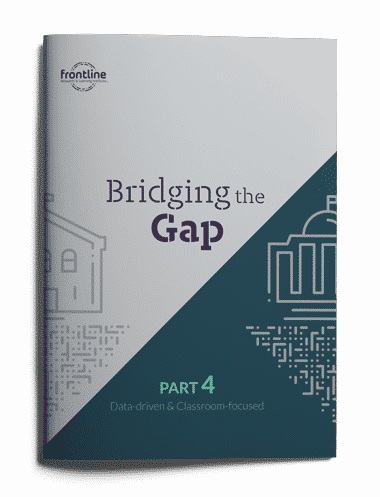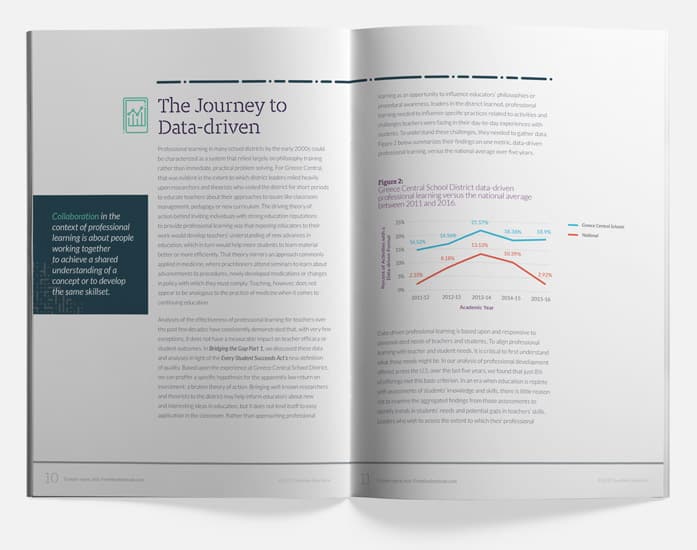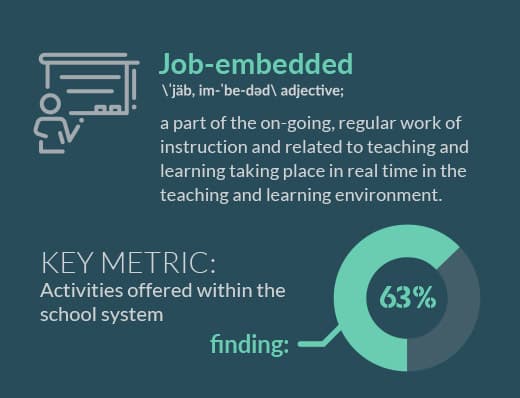Final report concludes national analysis of new definitions under ESSA and identifies New York school district as national leader in professional learning
MALVERN, Pa., June 8, 2017. — The Frontline Research & Learning Institute today released Bridging the Gap: Part Four, the final installment in a series designed to examine whether U. S. school districts are offering professional learning that aligns with the new federal definition of professional learning under the Every Student Succeeds Act (ESSA). Based on national analysis, this final report highlights New York’s Greece Central School District as a model for professional development that is aligned with new ESSA requirements.
“In the first three Bridging the Gap reports, our goal was to shed light on the differences between current practice and best practice in professional learning, based on the definitions proposed in ESSA,” said Elizabeth Combs, Managing Director of the Frontline Research & Learning Institute. “By focusing on the pioneering professional learning efforts of Greece Central, this final report takes us from theory to practice, demonstrating that great learning is possible through strong leadership and strategic investment.”
The Bridging the Gap series examines a representative sample of 203 school districts across the U.S., including data from over 107,000 teachers who participated in thousands of professional development activities over a five-year period. The first three reports define and examine the six indicators of quality in professional learning under ESSA: sustained; intensive; collaborative; job-embedded; data-driven; and classroom-focused.
In the last five years, according to the analysis, less than 20% of district professional learning activities meet the new federal criteria. In particular, just 8% of professional learning offered across the U.S. over the last five years met the basic criterion defining data-driven professional learning—a major focus of the final report installment.
The final report highlights the best practices of Greece Central School District, which is leading the nation in the adoption of data-driven professional learning. The district has revised its approach to professional learning over the last several years to begin with data from teachers and leaders about what educators need and use that to develop and approve professional learning. Their practices include regular meetings within and across schools to offer learning that is both relevant to each individual and also aligned with evolving best practice.
“In our research, we’ve found that many districts struggle to align with the federal definition of professional development but Greece stands out for their comprehensive classroom-focused, data-driven approach,” said Dr. Sarah Silverman, Senior Vice President at Whiteboard Advisors and co-author of the series. “What’s going on in Greece proves that investment in professional learning can be worthwhile, especially when districts design learning initiatives around their specific needs and goals.”
District leaders also abandoned old strategies of inviting popular professional development experts to host one-time events and moved to more activities that take place throughout the school year and are a part of teachers’ daily practice. In the first year of practice, the district saw a decline in new teacher turnover, which fell from 22% in 2014 to 18% last year.
“We built our professional learning programs on the belief that all learning should be integrated in the job and connected to the needs of our learners,” said Marguerite Dimgba, Director of Professional Learning at Greece Central. “A combination of thoughtful design, educator input, and data-driven practice is showing us that it is possible to develop effective and meaningful professional learning that drives results for our teachers and students.”
Located northwest of Rochester, New York, Greece Central School District serves just over 10,000 students, 42% of whom are eligible for free and reduced-price lunch. The district’s professional learning efforts include a Teacher Center Policy Board, which consists of 26 educators who meet regularly to surface and discuss data and evaluate the efficacy of professional development efforts.
[View full report series here: Bridging the Gap]About the Frontline Research & Learning Institute:
The Frontline Research & Learning Institute is a division of Frontline Education, an integrated insights partner to K-12 organizations nationwide. The Institute is a learning organization dedicated to providing data-driven research, resources, and observations to support and advance the educational community. Driven by the vast amount of records across Frontline’s comprehensive solutions portfolio, the Institute leverages data from more than 12,000 educational organizations and several million users to reach findings and provide benchmarks that inform strategic decision-making for the education community. The Frontline Research & Learning Institute works with Johns Hopkins Center for Research and Reform in Education to ensure all research reports and analyses are rigorously-validated and representative of national data.


